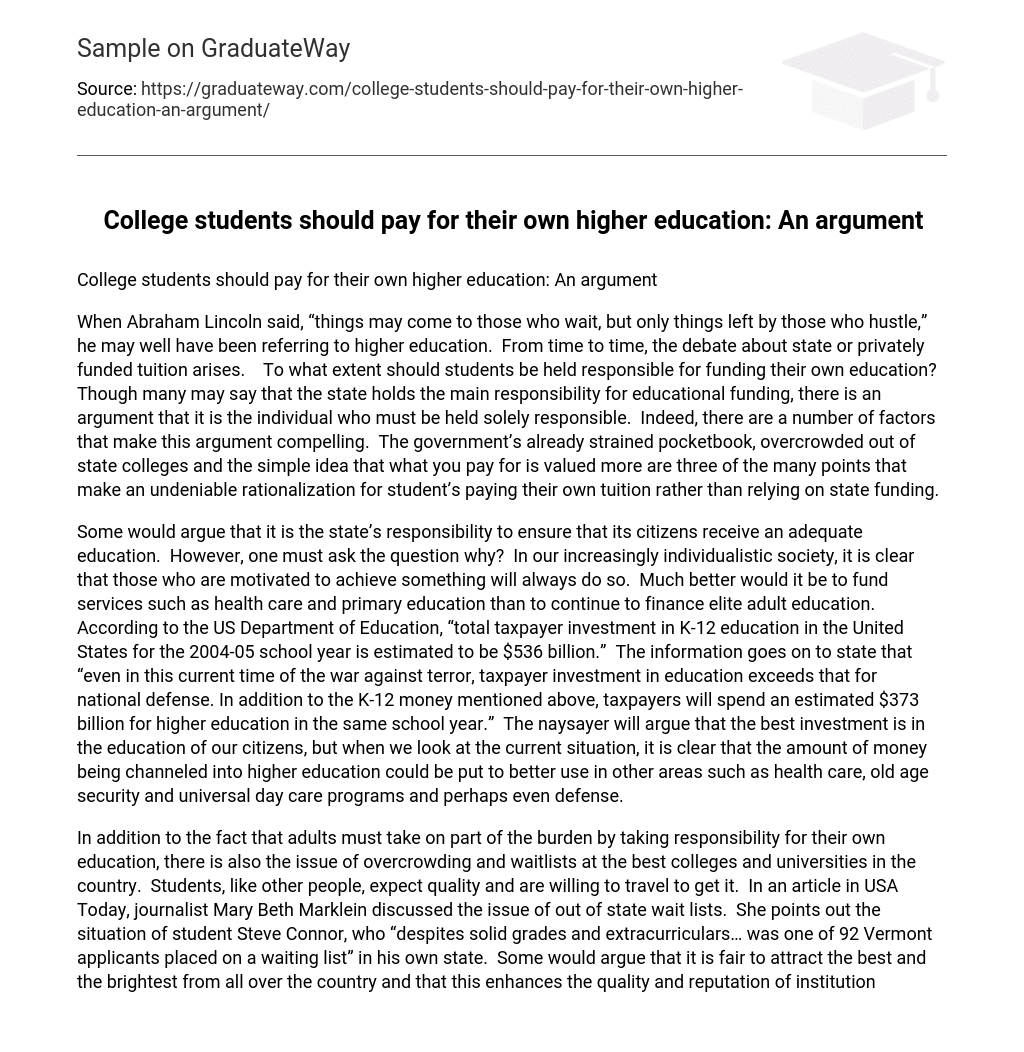When Abraham Lincoln said, “things may come to those who wait, but only things left by those who hustle,” he may well have been referring to higher education. From time to time, the debate about state or privately funded tuition arises. To what extent should students be held responsible for funding their own education? Though many may say that the state holds the main responsibility for educational funding, there is an argument that it is the individual who must be held solely responsible. Indeed, there are a number of factors that make this argument compelling. The government’s already strained pocketbook, overcrowded out of state colleges and the simple idea that what you pay for is valued more are three of the many points that make an undeniable rationalization for student’s paying their own tuition rather than relying on state funding.
Some would argue that it is the state’s responsibility to ensure that its citizens receive an adequate education. However, one must ask the question why? In our increasingly individualistic society, it is clear that those who are motivated to achieve something will always do so. Much better would it be to fund services such as health care and primary education than to continue to finance elite adult education. According to the US Department of Education, “total taxpayer investment in K-12 education in the United States for the 2004-05 school year is estimated to be $536 billion.” The information goes on to state that “even in this current time of the war against terror, taxpayer investment in education exceeds that for national defense. In addition to the K-12 money mentioned above, taxpayers will spend an estimated $373 billion for higher education in the same school year.” The naysayer will argue that the best investment is in the education of our citizens, but when we look at the current situation, it is clear that the amount of money being channeled into higher education could be put to better use in other areas such as health care, old age security and universal day care programs and perhaps even defense.
In addition to the fact that adults must take on part of the burden by taking responsibility for their own education, there is also the issue of overcrowding and waitlists at the best colleges and universities in the country. Students, like other people, expect quality and are willing to travel to get it. In an article in USA Today, journalist Mary Beth Marklein discussed the issue of out of state wait lists. She points out the situation of student Steve Connor, who “despites solid grades and extracurriculars… was one of 92 Vermont applicants placed on a waiting list” in his own state. Some would argue that it is fair to attract the best and the brightest from all over the country and that this enhances the quality and reputation of institutions, but if students are coming from other states and placing locals on wait lists, surely the college must expect them to pay for this privilege. In most cases, transplanted students will leave the state after their education resulting in a loss of investment for the state.
The final and perhaps most salient argument for having students pay for their own college tuition comes back to the old adage “you get what you pay for.” A student who pays for a course out of their own pocket is more likely to attend all lectures and take their education more seriously than a student who has gotten their education for free. It is human nature to take care of that which you own. If a student is forced to save for their education before they attend college, they will have an experience that will be much richer. It is no doubt that their outlook toward their education will also be that much more mature.
A policy that requires college students to finance their own education is a responsible one. It places less strain on the national budget and allows the government to focus on the needs of the country’s most vulnerable individuals. This policy also ensures that less weight is being applied on colleges to bear out of state students. Educational mobility should be inherent in the system, but those students who come from other areas should have the responsibility to carry their load – if they want the right to choose a certain college, they must be required to pay for that right. Finally, if we come back to the words of Abraham Lincoln, “things may come to those who wait, but only things left by those who hustle,” we see that it is only those who truly toil who succeed. Having the burden of paying for one’s own education is one more way of ensuring that we all take responsibility for our own lives. Each individual must take responsibility to ensure their own future and must be willing to sacrifice whatever it takes in the process. Financing one’s own education is a very small price to pay.
References Cited
Marklein, Mary Beth. “Are out-of-state students crowding out in-staters”
USA Today. September 31, 2006- Retrieved November13, 2006 from http://www.usatoday.com/news/education/2006-08-30-state-universities-cover_x.htm
US Department of Education. ” 10 Facts About K-12 Education Funding ” 2006.
Retrieved November 13, 2006 http://www.ed.gov/about/overview/fed/10facts/index.html





